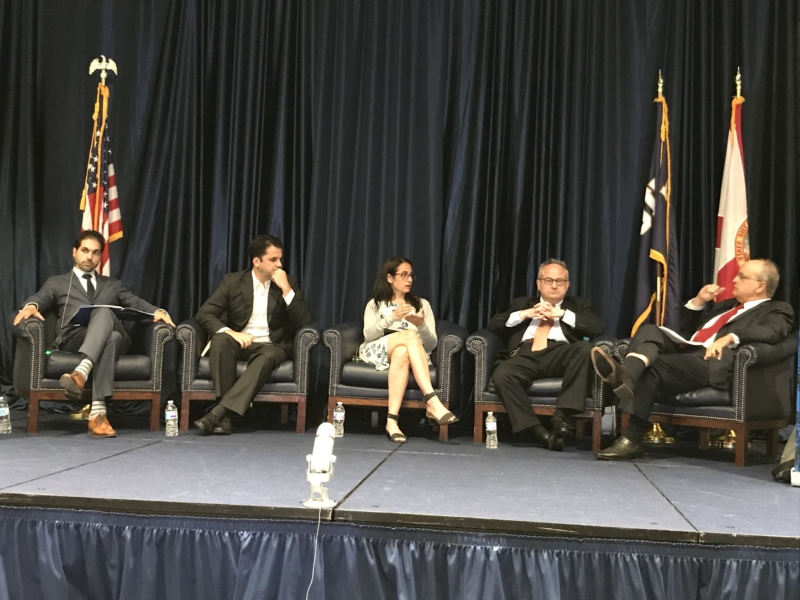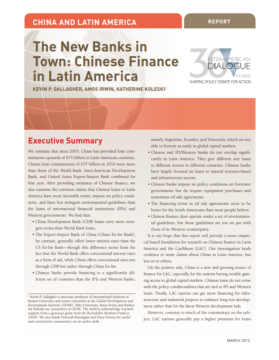Hugo Stay Home
Hugo Chavez, the Venezuelan president, has clearly been enticed by the Libyan drama, where his longtime friend and ally, Muammar al-Qaddafi, is under siege from rebel forces.
On Thursday, April 25 the Inter-American Dialogue partnered with FIU’s Kimberly Green Latin America and Caribbean Center to host an event called “Transition Interrupted?” to discuss the Dialogue’s Venezuela Working Group’s most recent report that analyzes the potential for democratic change in Venezuela. The panel was moderated by Frank Mora, the director of FIU’s LACC center. The panelists included Dialogue president, Michael Shifter, the Dialogue’s Rule of Law director, Michael Camilleri, Tamara Taraciuk, a senior researcher for the Americas at Human Rights Watch, and Raul Stolk, an author at Caracas Chronicles in Venezuela.
After welcoming remarks by Frank Mora, Michael Camilleri presented the three main pillars of the report: unity, agility and commitment. First, a united democratic opposition coalition is critical both domestically and internationally. Second, this coalition needs to be flexible, with the capacity to adapt to the changing balance of power, and in order to weigh difficult tradeoffs. Third, the opposition must stay engaged. It is important for the international community to not just make symbolic statements though issuing international communiques but to demand real change and support the courageous Venezuelans who are risking their lives to propel democratic change. Camilleri summarized the Venezuela Working Group’s position that the humanitarian situation would not be solved until there is a political transition.
Following this opening presentation on the potential political scenarios for democratic transition, Tamara Taraciuk delved into the extent of the humanitarian crisis. Although she agreed that a political transition is critical, she explained how the worsening humanitarian conditions demand immediate attention. She pointed to a Human Rights Report conducted by public health experts who found a huge outbreak of preventative diseases like malaria, HIV and tuberculosis. In addition, malnutrition is becoming a devastating problem. She explained that the humanitarian situation is so dire that it is not an option to wait for political change. Doctors have left the country, so people don’t have access to care. Therefore, she argued in favor of a large-scale UN led humanitarian relief mission. Rather than asking Maduro’s permission to allow aid across the border, Taraciuk explained that the UN must play a critical role in pressuring the regime. Specifically, the Secretary General should exercise political pressure on Maduro to allow a UN mission into the country. She explained how there is a protocol and a technical term for what is occurring in Venezuela- a complex humanitarian emergency. Under these conditions a large-scale humanitarian aid mission is justified.
We are at @FIULACC having a panel discussion with @MichaelShifter @camillerimj @TamaraTaraciuk @raulstolk and @FrankMora_FIU about prospects for democratic change in #Venezuela. pic.twitter.com/WFV2kL3oS3
— The Inter-American Dialogue (@The_Dialogue) April 25, 2019
Taraciuk also cautioned about the politization of humanitarian aid. Both Maduro and Guaidó have claimed credit for the small amounts of aid that have entered the country. She argued that the UN is critical for stopping this politization. Currently the UN is using silent diplomacy to negotiate letting aid into the country, however this has been largely unsuccessful. Taracuik argued that the UN must coordinate with the Lima Group to put stronger pressure on Maduro to let aid into the country.
Raul Stolk focused his remarks on the challenges facing Guaidó’s opposition. He explained how Guaidó’s government is struggling to seem legitimate, since it lacks control of the country’s military. In order to prove legitimacy, the government must successfully conduct acts of governance. However, this has proven difficult with the failed attempt to let aid into the country earlier this year and the multiple organized protests that have failed to oust Maduro. He called this the “fantasy transition” that the opposition envisioned in January. Sadly, these failed acts of governance have negative consequences as they weaken the opposition’s legitimacy. Shifter agreed with Stolk that Guaidó is facing many challenges. Specifically, he pointed out that the greatest obstacle is the armed forces that remain loyal to Maduro. The current situation is a political standoff because it is difficult to reach a deal with the military.
Despite the challenges in achieving negotiation, Shifter believes it would be a mistake to give up on dialogue. Taraciuk agreed and outlined key factors that could lead to dialogue: continuous strong international pressure, unity in the opposition, and internal mobilization (protests on the streets). Although it is difficult to maintain these pressures overtime, it is critical in pressuring Maduro to the negotiating table. Stolk agreed that unity in the opposition is critical. He explained how Maduro has strategically fractured the military through espionage and other tactics to instill distrust between them. He explained how the goal should be to unite the military first, rather than convince them to flip. Camilleri presented the example of the Montevideo mechanism as a time Maduro has exploited divisions in the opposition.
Due to these challenges in uniting the opposition, Stolk expressed his skepticism about how likely a “negotiation” would lead to a political transition. The term negotiation has a negative connotation for many Venezuelans because the Venezuelan authority has misused it in the past. Stolk argued that he doesn’t see negotiation with the current Maduro regime as leading to peace or to the end of the humanitarian crisis. He did, however, acknowledge that negotiation may be successful in the future with Chavistas, but not with the current state of the Maduro regime.
Our Venezuela Working Group is pleased to launch a second report called "Transition Interrupted?" which outlines potential scenarios and identifies risks and opportunities for those working to restore democracy in #Venezuela.
— The Inter-American Dialogue (@The_Dialogue) April 25, 2019
Access report here: https://t.co/wHPg6X1yNz pic.twitter.com/mUdIlaJb0e
Taraciuk pointed to the nuances of the military flipping. She spoke of the interviews she has conducted with Venezuelan military who have crossed the border into Colombia in February hoping to return with the aid mission. However, since the aid was not allowed into the country, the defected military remain in Colombia and are treated as asylum seekers. There have been arbitrary arrests, detainment and in some cases torture. She explained how it is not an easy decision for these military officials to leave their country and stand up for democracy in the first place. Then, stories of repression make is less likely that more military members will defect. Although there are many challenges to achieving a political transition through dialogue, the panelists agreed it is still the best option, and that a military intervention would do severe damage and create a security vacuum that would demand long term intervention in Venezuela.
After a fruitful discussion the panelists opened up the event to questions from the audience. One audience member inquired about the role of the diaspora in both the humanitarian and political crisis. Camilleri pointed to the Dialogue’s Migration program’s research on remittances. He explained how $3.4 billion in remittances were sent to Venezuela in 2018. One in four households are currently receiving remittances, pointing to the lack of food and medical supplies available in the country. However, Maduro can tax these remittances flowing into the country, so it is another way for him to make money off of the humanitarian crisis. Camilleri explained how Maduro allows just enough aid into Venezuela to contain the humanitarian crisis and prolong the economic recession.
Another question was asked about the potential of declaring Venezuela as a terrorist state. The panelists agreed this was unlikely, but pointed to the large presence of the ELN and the FARC in Venezuela. Camilleri highlighted the high level of criminality and drug trafficking and how this makes the crisis unique and more complex, in that it creates a massive vacuum of state authority. A third audience members questioned the effectiveness of sanctions, pointing out that sanctions have a 4% success rate worldwide in leading to regime change, and also worsen the economic crisis, hurting Venezuelan citizens. Taraciuk expressed the importance of making the distinction between targeted and economic sanctions. Targeted sanctions freeze assets abroad and cancel visas of high-level influential members of the regime. They are highly effective in weakening the regime. On the other hand, economic sanctions affect the whole economy and should not be imposed due to the already worsening humanitarian crisis. Camilleri added that the goal of economic sanctions is not to produce regime change. It is not an end in itself, rather it produces a hurting stalemate with the hope of forcing the regime to negotiate. He said that the process is long term and if there is any hope of pressuring the regime to a dialogue, the sanctions must be sustained and multilateral. When asked about the legality of military intervention under international law, Taraciuk responded that the legal options are limited. Military intervention is only justified in cases of genocide. Although the situation in Venezuela is tragic, a genocide is not occurring, so an intervention is not legally an option. That being said, a UN led relief mission is legal and encouraged.
Hugo Chavez, the Venezuelan president, has clearly been enticed by the Libyan drama, where his longtime friend and ally, Muammar al-Qaddafi, is under siege from rebel forces.
Estimates of the volume, composition, and characteristics of Chinese lending to the region since 2005.
Is the Venezuelan government likely to comply with the IACHR’s ruling or will it uphold the ban?
 Leonie Rauls / FIU Modesto A. Maidique Campus
Leonie Rauls / FIU Modesto A. Maidique Campus
